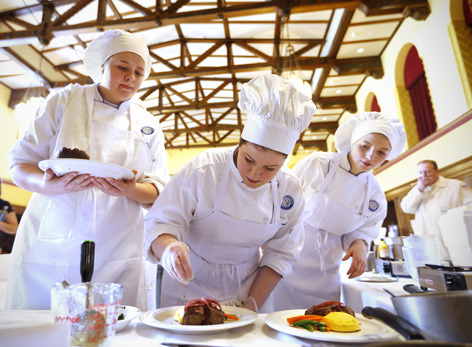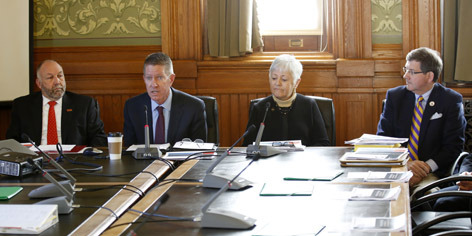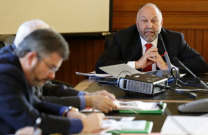Need not argue to win

Des Moines Central Campus student Alexis Morris, center, puts the final touches on a main course plate as teammates Heidi Seher, left, and Amanda Grimm watch critically during the 2015 Iowa ProStart® Invitational held March 2 in the Memorial Union Great Hall.
More than 200 students from 14 Iowa high schools competed in the event. In a morning culinary competition, teams had 60 minutes to prepare a three-course meal using provided ingredients and two butane burners. During an afternoon management competition, teams were judged on their research and visuals for a new restaurant concept. The winning teams from each competition -- Waterloo West and Cherokee Washington high schools, respectively -- will represent Iowa in the National ProStart Invitational April 18-20 at Disneyland in Anaheim, California.
ProStart® Iowa is sponsored by the Iowa Restaurant Association Education Foundation. This is the first time the competition was held at Iowa State, hosted by ISU's hospitality management program. Photo by Christopher Gannon.
A big request

President Steven Leath (left) was part of the team that visited the State Capitol on Feb. 26 to present the regent universities' funding requests for next year to the joint Education Appropriations Subcommittee. With Leath are (l-r) Board of Regents president Bruce Rastetter, University of Iowa president Sally Mason and University of Northern Iowa president Bill Ruud.
Noting that two-thirds of Iowa State's enrollment growth in the last eight years is in the colleges of Engineering and Agriculture and Life Sciences, Leath told committee members, "we want them to continue to come in ag and engineering, we want them to graduate, we want them to get good jobs, but this is getting to be increasingly difficult for us." Photo by Christopher Gannon.
Full transcript of Leath's 10-minute presentation to the subcommittee.
Property purchase, parking rates are on regents' agenda
Parking permit increases, 2015-16 residence hall and meal plan rates, an Airport Road property purchase and a new degree program in early childhood education are on the ISU agenda when the state Board of Regents meets March 11 at the University of Iowa. Audio of all open sessions will be streamed live on the board's website. The agenda also is online.
Property purchase
Iowa State will seek board approval to purchase five acres and a building at 925 Airport Rd. for $1.4 million. Initially, it will meet some university long-term storage needs, and it may be used as a shipping/receiving facility to reduce traffic and congestion on campus. The large asphalt lot could be used to store seasonal rental vehicles, freeing up stalls in campus lots. The property is the former site of a John Deere implement dealership and is adjacent to a Central Stores storage facility.
Items to potentially be stored in the building include ISU Theatre props and costumes, which currently are stored in the Industrial Education Building (scheduled to be razed); and Reiman Gardens' Nature Connects LEGO exhibits between installations. Additional warehouse space also is needed for ISU Research Park growth, particularly the expansion of Harrisvaccines.
New bachelor's degree
The College of Human Sciences will seek approval for its proposed bachelor of science program in early childhood education and programming. It would be offered entirely online through the seven-university Great Plains Interactive Distance Education Alliance, and students would take courses at all seven schools. The program's primary focus is to prepare professionals to work as teachers or administrators in childcare programs (infant to 8 years old). Participants would not be licensed to work in public schools.
The program is being offered in response to a request from the U.S. departments of Agriculture and Defense to meet the educational needs of military service members and spouses who are interested in careers working with young children, and to better serve U.S. military installations. It's anticipated that most participants will be members of military families.
2015-16 parking rates
Parking permit prices, including the Memorial Union ramp, would go up $3 to $12 annually under proposed rates for the year that begins July 1. An hourly rate increase of 25 cents, for hours five and above, also is proposed for the MU ramp, with the daily (hourly) maximum rising to $11.50 (from the current $11). The board will vote on parking proposals at its April meeting.
Parking permit rates
|
Permit |
Current |
Proposed FY16 |
|
24-hour reserved |
$878 |
$890 |
|
Reserved |
$503 |
$515 |
|
General staff * |
$158 |
$164 |
|
Departmental |
$158 |
$164 |
|
Vendor |
$197 |
$203 |
|
Staff motorcycle |
$53 |
$56 |
|
Memorial Union ramp |
|
|
|
Employee |
$510 |
$522 |
|
Annual |
$510 |
$522 |
|
Semester |
$220 |
$226 |
|
Winter ** |
$214 |
$220 |
|
Summer |
$177 |
$182 |
*Includes residence department and Ames Lab staff
**Valid November-February
2015-16 residence/dining rates
The residence department's preliminary FY16 budget is based on student occupancy of 12,774, an increase of 537 students from this year. To accommodate student demand for housing beyond the existing permanent spaces, 329 beds will be offered in residence hall dens, and off-campus apartments operated by the department will expand to 1,454 beds.
As proposed, most residence hall and on-campus apartment rates would go up 3 percent on July 1. That's an increase of $112 to $216, depending on the building. The exceptions are a proposed 2 percent increase ($93-$113) at University and Schilletter Village apartments, and 8 percent increases ($464-$586) for off-campus leased apartments. Student meal plans would go up approximately 3 to 3.5 percent, depending on the plan selected.
The proposed increase for the most common double room (no AC) and meal plan (225 meals and $200 Dining Dollars per semester) is $240 (3.07 percent).
As proposed, the "door rate" in campus dining centers would go up 25 cents next year, to $9 for breakfast and $11 for lunch and dinner. The board will vote on residence and dining proposals at its April meeting.
Other items
In other business, Iowa State will:
- Seek approval to revisions for the 2015-16 general catalog. The changes include 75 title changes, 123 new courses and 195 dropped courses, for a net effect of 72 fewer courses.
- Submit the annual report (as of fall 2014) on student retention and graduation rates. The fall 2013 entering class had a one-year retention rate of 86.4 percent at ISU, 86.1 percent for the three regent universities, and 77.9 percent for public four-year colleges nationally. The six-year graduation rate for the fall 2008 entering class was 68.9 percent at ISU, 68.4 percent for the three regent universities and 49.7 percent for all public four-year colleges nationally.
- Submit the annual human resources report (calendar year 2014), which combines information on sick and vacation leave use, insurance and retirement programs, retirements, faculty salary comparisons and the regents' merit system.
- Submit the annual report (calendar year 2014) on campus safety and security.
Share your comments
Individuals have an opportunity to provide early input on agenda items at a public hearing Thursday, March 5 (6-7 p.m., MU Oak Room). Comments will be video recorded for board members.
Emerging Leaders Academy seeks nominations
The Office of the Senior Vice President and Provost is looking for nominations for the 2015-2016 Emerging Leaders Academy (ELA).
ELA is an academic-year initiative to develop faculty and professional and scientific staff who either currently serve in leadership roles at Iowa State or aspire to hold leadership positions. Participants attend monthly leadership sessions on leadership theory and practice, current issues in higher education, and university-related challenges and opportunities.
John Schuh, Distinguished Professor emeritus of educational leadership and policy studies, will lead the program.
Eligibility criteria
To participate, faculty must be tenured, a senior lecturer or senior clinical faculty. Eligible P&S staff must have an appointment at P35 or above. All applicants should be aspiring or recently appointed leaders of a department, college, division, unit, center or institute.
The 2015-16 group will begin meeting in late August. Nominations should be submitted online by March 25; selection of participants will be completed by April 15.
Additional information about the program, including meeting dates next year and the electronic nomination process, is online. Questions may be directed to associate provost for faculty Dawn Bratsch-Prince, 294-6410.
Leath makes funding case to Legislative subcommittee
Transcript of President Steven Leath's funding request for fiscal year 2016 to members of the joint Education Appropriations Subcommittee, Iowa Legislature, on Feb. 26:
Progress made on top priorities
1. Student experience
This is our sixth consecutive year of record enrollment, our eighth consecutive year of growth. We have nearly 35,000 students on campus. Sixty-eight percent of our enrollment growth is attributable to the colleges of Agriculture and Life Sciences and Engineering. I want to point out that these are programs that students in Iowa cannot get at any other public or private institution in the state, and that's where our growth is coming from. They're also the areas that continue to be the primary drivers of the state's economy.
Despite the huge numbers on campus, we have the highest retention rate in the regents system -- 86.4 percent. My colleagues also have really high retention rates, but the point is, it's a great credit to our faculty and staff to have that high, high rate with such a large student body.
To deal with this, we had 105 new tenure-track hires last year; we're going to try to hire 130 more this year to keep the student-faculty ratio good. We've increased our capacity with this many students and faculty. With your help, we opened Elings and Sukup halls in the fall, which anchor our biorenewables complex and our agricultural and biosystems engineering department. We're about to start the biosciences facility, which was funded by the state. Again, that will help us because we've seen a 55 percent growth in this area over the last few years.

President Steven Leath presents Iowa State's FY16 state funding request to legislators on Feb. 26. Photo by Christopher Gannon.
As a leading land-grant institution, we're committed to keeping college affordable and attainable. Access is hugely important to us. In an effort to do both, we have joined with 10 other major public institutions to form the University Innovation Alliance to really move degree attainment forward.
We're also a strong supporter of the governor's Home Based Iowa initiative, we're proud to have been named a Champ Institution, we were recognized as a military-friendly school. You'll see that emphasis on pro-military continue.
2. Economic development
We're huge contributors to the economy of the state, we're proud of the fact that our students are being placed at 95 percent -- either in jobs or graduate school -- when they graduate. That's an unusually high number, especially for a school our size. Sixty-seven percent of our Iowa students stay in Iowa, as well as over 22 percent of our nonresident students.
They're not only getting jobs, but they're leaving school with less debt. I made a point to say I'm trying to drive down student debt. The number of students graduating with debt has dropped 3.7 percent since I've been here. The average debt load for graduates is dropping, too. In fact, it dropped another 5 percent just last year, so we'll continue to drive down student debt.
We're more organized and efficient when it comes to economic development. We've created a new unit for economic development, the office of economic development and industry relations. [That staff and other relevant units] all will be consolidated in our new economic development core facility, which is a building funded by the Legislature. This will continue to improve our ability to serve the economy of Iowa.
It's also part of a major expansion at the research park. We're doubling the size of the park, we're creating jobs, and having a huge impact on the economy.
3. Research
We're continuing to drive innovation in the state through our research efforts. We had $368 million in new awards last year, a 22 percent increase. We secured a tier one partnership in a large digital manufacturing lab that's expected to create 75,000 jobs. Our Critical Materials Institute already has disclosed 18 new inventions, and my new initiative on multidisciplinary research has resulted in $200 million in new grant applications in the last couple of years. So we're having tremendous successes in research; these will translate into jobs through our economic development efforts.
4. Campus environment
Our fourth priority is to provide a welcoming, safe and inclusive campus. Our campus is extremely diverse, the most diverse it's ever been. Twenty-two percent of our student body considers themselves multicultural or international, so we'll be hiring our first-ever chief diversity officer to implement recommendations from a large diversity study and a second study from the University Committee on Women.
FY16 appropriations request
1. Operating funds
We're asking for a 1.75 percent appropriation increase [$3.17 million], and it's really aimed at continuing student success. To deal with this large increase in students, we've had to do things differently. Our enrollment has increased more than 30 percent, but our faculty hires have not kept pace despite our aggressive efforts. So we used additional money to hire more faculty, particularly in the university's signature high-growth areas like agriculture, engineering, IT, big data. We'll also use the money to enhance areas in academic advising and student support, including making additional investments in learning analytics and student support, more academic advisers, and upgrading our classroom and learning spaces and improving our IT infrastructure.
We'd like to take this money, combine it with savings realized by the board's TIER (Transparent Inclusive Efficiency Review) study so we also can freeze tuition for resident undergraduates for a third straight year.
2. Directed appropriations
The second appropriations request is for the Ag Experiment Station. There currently are more than 750 projects tied to the Ag Experiment Station. This is a $1.04 million request for the most important industry in the state of Iowa. Ag Experiment Station/ag research funds were cut disproportionately when the budgets were cut, so our ability to serve the ag community in Iowa was really crippled and we're asking for help to move that forward and put it back to what it was prior to the 2011 funding cuts.
The next three are very, very modest requests: The first is for extension and outreach for $319,668. I want to remind the committee that we have offices in all 99 Iowa counties. Extension is a huge program and this is a very modest request for a program that large. Last year, extension directly touched 1 million people. If you think about that, that's one in every three Iowans. We really ask for your help in letting extension move forward.
There are two smaller requests, one for sustainable agriculture [$6,955 increase] and one for livestock disease research [$3,025 increase]. For example, support in livestock disease research would allow us to work on odor management and things like this that affect all Iowans.
3. Student Innovation Center
This is the only capital project coming from the regents this year. With 35,000 students -- and we expect more this fall -- we need to provide facilities for them. The reason 95 percent of Iowa State kids get jobs is because they have experiential learning, they've done things with their hands. We keep hearing that from employer after employer. But the space they're in now is the very, very old Armory. It's too small, it's not even safe anymore for the type of things we do, so we want to have an innovation center where students could do these types of projects: fabrication, large-scale, hands-on discoveries.
We were reluctant to bring it to you initially because it's an $80 million request. But through a number of efforts, we've come forward with half the money -- $40 million – and that's dependent on a $20 million gift from two alums who are willing to put $20 million cash up to make this go if the Legislature and the governor will provide half the money. It's a tremendous opportunity to leverage money. We've never brought a request like this to you where we put up half the money. This would be, if we can get this approved, the largest private gift we've ever had in Iowa State's history for an academic building. We really request your help because this is what's getting the kids jobs and making them great assets to the Iowa economy.
Performance-based funding model
If you look at the state map, you could call it a Cyclone state. Seventy-four of the 99 counties -- that's three-fourths of the counties -- are sending most of their kids to Iowa State. We're happy about that; we're glad to serve. They're sending them there in agriculture and engineering, which is something they can't get anywhere else in Iowa. But we need some help; we can't take 20,000 Iowa kids and 35,000 students without any help from the Legislature.
When I got here, I promised to provide access and affordability. But I also reminded everybody that access and affordability without quality is not a good value. So we do need some help, and the question is, how do we get there?
The regents spent a lot of time and formed a Blue Ribbon task force to look at how we can do this. We do have legitimate concerns. We received a little over $9,000 for every resident student, which is below the cost of instruction. In fairness, UNI receives $8,700 per student, a similar amount. The University of Iowa receives over $14,000 per resident student. We're not saying necessarily that this needs to be equal, but it needs to be equitable. You can't send 20,000 students to one institution, in high-cost programs like ag and engineering, and not provide any resources. This is a state without enrollment growth funding, so we ask that you think seriously about how we're going to find an equitable way to provide resources to these students. We want them to continue to come in ag and engineering, we want them to graduate, we want them to get good jobs, but this is getting to be increasingly difficult for us.
The regents have thought about this a long time. If we use performance-based funding, that additional funding will allow us to increase personalized learning, invest more in our learning communities which leads to higher retention rates, provide more opportunities for online learning and improve efficiencies on our campus.
I think the new funding model is really good. It follows Iowa students and there's certainly nothing wrong with Iowa tax money following Iowa kids. But it also puts emphasis on degree attainment, progress toward graduation, economic development -- things that we all should value. In my opinion, I have not seen a better model to fix this.
Please remember we have 20,000 Iowa kids on this campus and we could use your help in moving forward.
Conclusion
I know you've had an unwavering commitment to higher education in this state, but I think we're in a new era. If you think about the economy of Iowa, we're in a position to really help drive that forward with your help.
Thank you.
Grappling for a title

At 10 a.m. Saturday morning, the doors of Hilton Coliseum will open to Big 12 Conference wrestling fans for this year's championships.
Four teams -- Iowa State, Oklahoma, West Virginia and two-time defending champion Oklahoma State -- will be vying for the league trophy. Wrestlers compete in 10 weight classes for individual titles. The Cyclones, whose last team title was a share of the crown in 2009, have two defending Big 12 champs in 197-pound senior Kyven Gadson (pictured) and 184-pound sophomore Lelund Weatherspoon.
The morning session begins with semifinals at 11 a.m. and third-place matches at 12:30 p.m. Free video streaming will be available live on Big12Sports.com. Doors open at 5 p.m. for the evening session, with championship matches at 7 p.m. The finals will be streamed live by FoxSportsGo (free for subscribers to some TV providers).
All-session tickets are $20 ($15 youth). Single-session tickets go on sale Thursday, March 5, and are $10 ($5 youth) for the morning session, and $20 ($15 youth) for the evening session. Photo courtesy of athletics communications.
